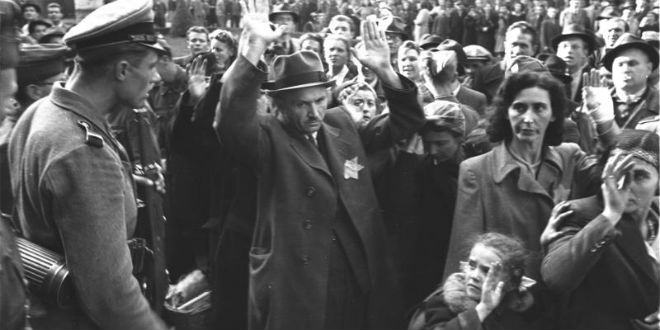Only five Americans are listed as Righteous Among the Nations at Israel’s official Holocaust memorial, Yad Vashem. Righteous Among the Nations is a title recognizing non-Jews who risked their lives to save Jews during World War II.
The tale of two of these recognized champions, American minister Waitstill Sharp and his wife, Martha, is recreated in the new Ken Burns film, Defying the Nazis: The Sharps’ War, that aired on PBS stations in the United States.
The film reveals how the couple rescued refugees from Nazi harassment as the war engulfed Europe.
Joukowsky learned of his grandparent’s heroics when he was given a ninth-grade task to write about someone with moral courage. He went home and asked his mom who to interview and write about. She told him to talk to his grandmother.
“She did some cool stuff during the Second World War,” Joukowsky related to JNS.org. “I didn’t know this magnificent doting person worked surreptitiously rescuing lives, assisting people escape and laboring with Waitstill laundering money on the black market. It transformed her life.”
In 1939, the Sharps left their home and young children in Wellesley, Mass. and traveled to Prague, Czechoslovakia, after accepting a mission from the American Unitarian Association to aid in the growing refugee crisis.
With only $40,000, the couple rapidly learned spy craft and mounted hazardous relief and rescue missions across a Europe at war, rescuing political dissenters, refugees, and Jews at the start of the Second World War.
After barely dodging the Gestapo, the Sharps returned to Europe a year later as members of the recently formed Unitarian Service Committee and continued their aid work in Vichy, France.
The refugees needed money, documents, and help and the Sharps moved into that void and assisted those in jeopardy to leave, said Holocaust scholar Deborah Dwork in the documentary.
Joukowsky is hopeful the inspirational movie will change the life of many since it is similar to the present international refugee catastrophe, Breaking Israel News reported.
There are remarkable situations, unfortunately, between the loss of life, starvation and the disruption of Europe following the war and the refugee crisis that arose from that conflict and the scale of what’s occurring now, Joukowsky told JNS.org.
“You are swapping a tribe of people for a different tribe of people but it’s mostly children and women who agonize,” he says. “The international community needs to work co-operatively.”
Through Burns’ captivating storytelling, he extracts a historical page – the six million Jews murdered during the Holocaust – an idea that may be hard to grasp for many – and humanizes it through the full history of the individuals he documents.
